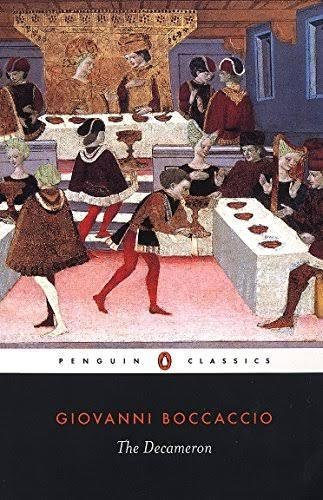🦋 A Love That Never Died: The Tragic Tale of Lisabetta and the Pot of Basil

✍🏻INTRODUCTION:
In Lisabetta and the Pot of Basil, one of the many tales in The Decameron by Giovanni Boccaccio, the story focuses on the heartbreaking consequences of forbidden love, family control, and grief. The plot follows a young woman named Lisabetta, who secretly falls in love with a man beneath her social class. When her wealthy brothers discover the affair, they brutally end it in an attempt to protect their honor. But Lisabetta’s sorrow doesn’t disappear, instead, it grows deeper, turning into an unforgettable symbol of love and loss. This story stands out for its emotional intensity, its tragic ending, and the way it explores the conflict between love and social expectations.
✍🏻SUMMARY:
Lisabetta is a young woman who lives with her three older brothers in Messina. They are rich merchants who are strict and protective. Without their knowledge, Lisabetta falls in love with Lorenzo, a young man who works for them. The two secretly continue their relationship until the brothers find out. They are angry and embarrassed, they decide to kill Lorenzo and hide his body in a remote place. Lisabetta notices Lorenzo is missing and becomes very worried. One night, she dreams that he tells her the truth and shows her where he is buried. She goes where it was buried and finds his body. When she finds his body, she cuts off his head. She puts it in a pot, plants basil over it, and waters it daily with her tears. Her grief becomes so overwhelming that she loses her health and eventually dies from heartbreak. Her brothers, realizing what she had done, take away the pot, but it's too late as Lisabetta is already gone.
✍🏻ANALYSIS:
📍Themes:
One of the strongest themes in this story is forbidden love. Lisabetta and Lorenzo’s relationship is not accepted by her brothers, simply because Lorenzo is not of high status. This shows how in the 14th century, love was often less important than wealth, family reputation, or social position. The story also explores loyalty in love, as Lisabetta remains devoted to Lorenzo even after his death. Her love does not fade which it only grows stronger, to the point where she cannot live without mourning him. The moral lesson here is that true love cannot be controlled by others, and trying to destroy it can lead to tragedy for everyone involved.
📍The characters roles and their Characters Development:
Lisabetta begins as a quiet, obedient woman but changes throughout the story as she suffers loss. Her emotions become more intense, and we see her strength in how she goes to find Lorenzo’s body. Her love turns into deep sorrow, showing character development from innocence to emotional devastation. Her brothers, on the other hand, do not change. They represent the traditional values of power, control, and pride. They act without empathy, and even though they succeed in killing Lorenzo, they ultimately lose their sister too. Their cruel behavior leads to destruction rather than peace.
📍Literary Devices:
Boccaccio uses symbolism to give deeper meaning to the story. The pot of basil is a clear symbol of Lisabetta’s love and grief. It hides Lorenzo’s head, which she wants to keep close to her. She waters it with her tears, showing how sorrow feeds her memories. This object becomes a powerful image of mourning and devotion. The dream is another literary device used to move the plot forward and reveal the truth in a dramatic way. It’s a supernatural aspect that reflects how strong emotions can guide people, even revealing hidden truths. Boccaccio also uses emotional imagery to help readers feel Lisabetta’s pain, especially in the descriptions of her crying and fading away.
📍Historical Context and Modern Relevance:
In terms of historical context, this story reflects the values of the 14th century, where family honor and arranged marriages were very common. Women had very little control over whom they could love or marry, and any relationship outside the family’s approval could lead to punishment or shame. The brothers’ actions, while cruel, represent a real concern of that time, keeping the family name clean and powerful. However, even though the tale is from the Middle Ages, it still connects with modern readers. Many people today such as me can relate to the pain of losing someone, to being told they can’t love someone, or to the struggle between personal happiness and family expectations. The emotions in the story; love, sadness, betrayal are still very real and relatable today.
✍🏻PERSONAL RESPONSE:
What stood out to me most was how Lisabetta stayed loyal to Lorenzo even after she found out he was dead. The part where she hides his head in the pot and waters the basil with her tears was sad, but also powerful. It showed how deeply she loved him, even though others tried to stop that love. I found the story emotional and touching, even though it ended in a tragic way. It was easy to feel connected to Lisabetta’s pain, and I could imagine how hard it must have been for her to live with such a big loss. Even though the actions were extreme, the feelings felt real and moving.
✍🏻CONCLUSION:
Lisabetta and the Pot of Basil is a powerful and tragic tale that still matters today because it talks about feelings that never go away; love, loss, and the need for freedom in choosing who to love. It warns against the dangers of trying to control other people’s lives and reminds us how painful it can be when love is not allowed to grow freely.
Even though it was written hundreds of years ago, the story still speaks to readers like me today through its strong emotions and meaningful symbols. It shows us that real love can survive anything, even death, and that no one should be forced to live without it.







